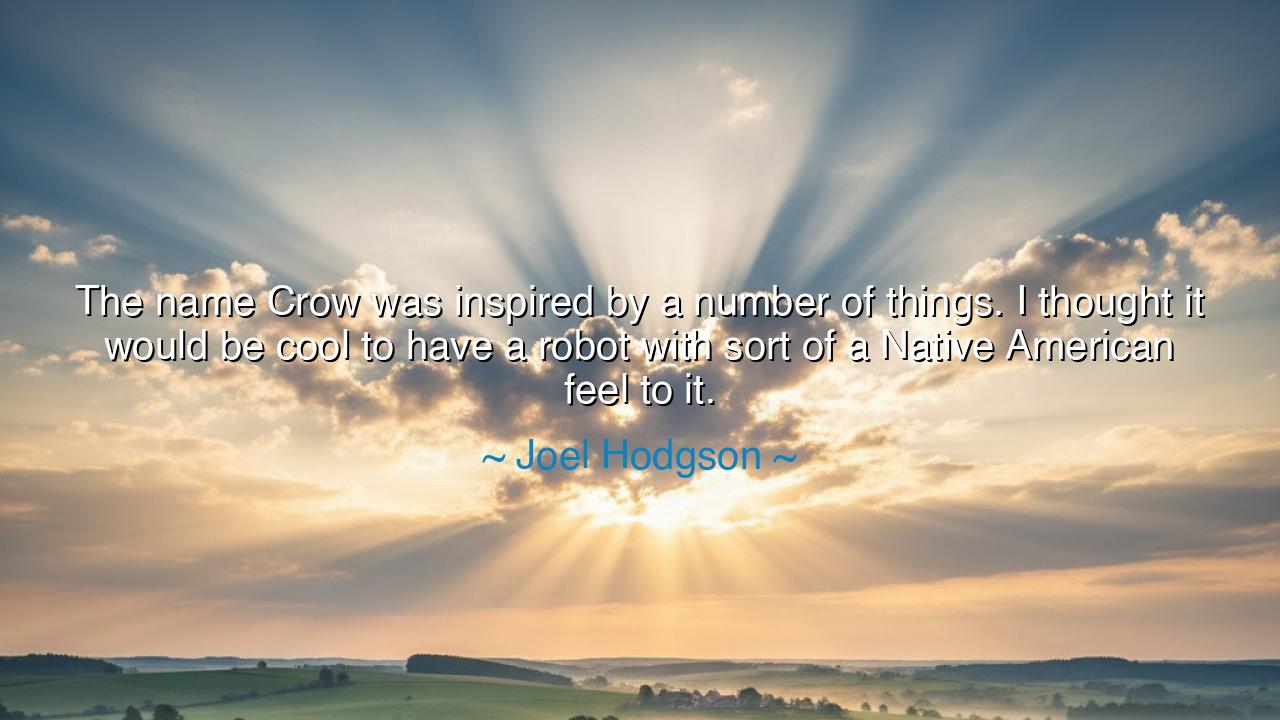
The name Crow was inspired by a number of things. I thought it
The name Crow was inspired by a number of things. I thought it would be cool to have a robot with sort of a Native American feel to it.






In the ancient world, the power of names was understood to be far more than just a mere label. A name was a symbol—a connection to something deeper, a bridge between identity and the unseen forces that shape a person or object. When Joel Hodgson speaks of the creation of the character "Crow" and how the name was inspired by a Native American feel, he touches on a timeless truth: that names carry power, and their meaning transcends mere sound, linking the named to a wider, symbolic realm. "Crow", in this sense, becomes more than a mere designation for a robot; it is a reflection of history, spirit, and cultural resonance.
The ancient Greeks understood the significance of names and their deep connection to fate and destiny. In Homer's epics, names are often laden with meaning, pointing to the character’s destiny or role in the grand tapestry of the world. Achilles, whose name echoes with the promise of greatness and heroism, is one example. The ancient Greeks believed that the right name could capture the essence of a person’s soul or purpose in life, shaping how others would perceive them and how they would fulfill their journey. Hodgson’s choice of Crow reflects this ancient understanding of how names can embody meaning, symbolizing not just an identity, but an allusion to cultural heritage and connection.
The Crow name also evokes the Native American worldview, where animals are often spiritual totems that represent more than their physical form. For example, in many Native American cultures, the crow is seen as a symbol of transformation, a messenger between the physical and spiritual worlds, often associated with wisdom, change, and prophecy. The Crow is also a creature that endures, adapting to various environments and challenges. By linking a robot to such a name, Hodgson cleverly invokes the spiritual and transformational qualities of the crow, suggesting that the robot, like the bird, is not merely a mechanical entity but also a symbol of evolution, growth, and adaptability in a changing world.
Similarly, the great epic heroes of the past, such as Gilgamesh or Hercules, were often linked to mythical creatures or natural forces that gave their lives deeper meaning and connection to the universe. Gilgamesh, for example, is part man and part god, and his name evokes a sense of divinity and fate. Just as these ancient figures were imbued with powers and symbolic significance through their names, so too does Crow carry with it the weight of the spiritual world and a deeper purpose. It suggests that, even in the realm of technology and science fiction, the symbolic weight of names cannot be overlooked.
This choice of name is not simply an aesthetic decision; it is an exploration of how identity—even for an artificial being—can transcend mere functionality and touch upon the cultural soul of its creators and users. By choosing to name a robot Crow, Hodgson evokes the powerful archetypes of nature, transformation, and spirit, suggesting that even in the most mechanized of worlds, there exists a deep connection to the natural and spiritual realms. In this way, Crow becomes more than just a robot; it is a symbol, an extension of humanity’s quest for understanding, growth, and transformation in the face of ever-advancing technology.
The lesson that we can draw from Hodgson’s creative process is this: names and symbols are powerful, and they shape how we understand and interact with the world around us. Whether we are naming a robot, a child, or a project, the words we choose carry a resonance that extends far beyond their immediate meaning. They carry with them history, cultural significance, and potential for transformation. Just as the ancient Greeks believed in the importance of names, and as Native American traditions see the world as interconnected through symbols, we too must recognize the deep power of what we name and create.
As we move forward in our own lives, we must be mindful of the names we give to our dreams, our projects, and our relationships. Whether we are shaping a new technology, embarking on a creative journey, or simply choosing how we identify ourselves, we must recognize the symbolic weight behind every name we choose. It is through this awareness that we connect not only to the past but to the future, ensuring that the names we create today will have the power to shape the world of tomorrow.






AAdministratorAdministrator
Welcome, honored guests. Please leave a comment, we will respond soon